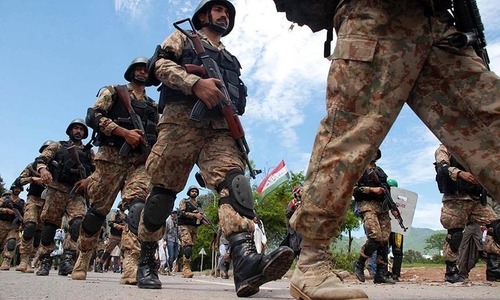ISLAMABAD: A new accountability law that aimed at leaving no ‘sacred cows’ untouched was sabotaged by the Pakistan Tehreek-i-Insaf (PTI) and Mutahidda Qaumi Movement (MQM) on Wednesday when both parties rejected the nearly complete draft of the law they had so far been helping to develop.
Both parties frustrated the nearly year-long process of drafting legislation during the 13th meeting of the Parliamentary Committee on National Accountability Laws, which had almost reached an agreement on bringing judges and generals into the ambit of accountability laws if they had committed any sort of corruption.
Before Wednesday’s meeting, all parliamentary parties had agreed to proposals to ensure across-the-board accountability, which would bring judges and generals within the purview of the National Accountability Bureau (NAB). However, at the last minute, both PTI and MQM took a sudden U-turn, shattering the consensus built around the nearly-finalised bill.
MQM members rejected the draft bill outright, while PTI’s Dr Shireen Mazari was of the view that her party would come up with its own recommendations for across-the-board accountability.
Law Minister Zahid Hamid, who chaired the committee meeting, made no secret of his displeasure over the two parties’ stance. He asked why, if PTI and MQM had reservations, were they not mentioned in the previous 12 meetings.
“Until now, every proposal of the bill was being approved through consensus. I don’t know what suddenly happened to the PTI and MQM today,” he said after an in-camera meeting that lasted only 20 minutes.
At the committee’s last meeting, it was decided that representatives of all parties would consult their respective heads and would apprise the committee about their party line on the draft bill in the meeting that was to be held on Wednesday.
He said that PTI vice chairman Shah Mehmood Qureshi and an MQM representative had been present in all 12 previous meetings of the committee, but had shown no concerns over the draft bill. “The process has been spoiled after almost 90pc of the bill had been approved through consensus,” he said.
Earlier, Dr Mazari — who replaced Mr Qureshi on the committee — informed the parliamentary body that her party had six to seven objections on the bill. “We do not accept the government’s bill,” she added.
She said PTI would forward its reservations to the committee in writing, adding that the current draft seemed to be aimed at covering up the corruption of politicians.
Sources privy to the drafting process told Dawn the government wanted to have the bill consensually approved by the committee and both houses of parliament.
They said that despite the PTI and MQM’s opposition, the committee and parliament could approve the bill, but that would only provide the parties an excuse to agitate.
Talking to Dawn after the meeting, Pakistan Peoples Party Senator Farhatullah Babar — who had presented the proposal regarding the inclusion of judges and generals in the definition of the term ‘public office-holder’ — said that both parties had blocked the smooth passage of legislation that was meant to bring ‘sacred cows’ under the ambit of accountability laws.
Tomorrow, no one could blame any institutions, but legislators would be blamed for not making a law ensuring across-the-board accountability, even though there was a chance to do so, he said.
At the last meeting, Babar had further softened the language of his proposal regarding judges and generals by terming them both public office-holders, and presented a new definition which stated that: “Everybody who gets financial benefits from the national exchequer falls in the category of public office-holder”.
The existing National Accountability Ordinance 1999, promulgated by General Pervez Musharraf, brought public office-holders, civil servants, politicians and even civilians under the ambit of the law, but exempted armed forces personnel as well as judges of the superior courts.
Published in Dawn, October 12th, 2017














































